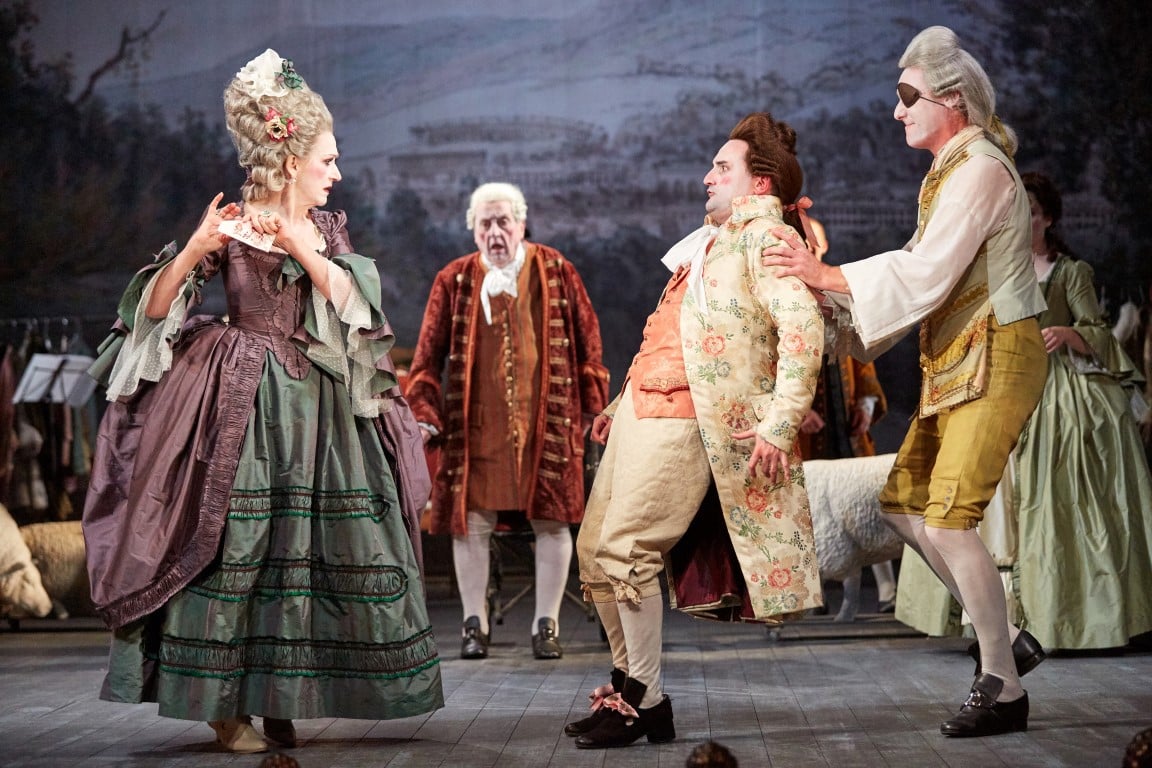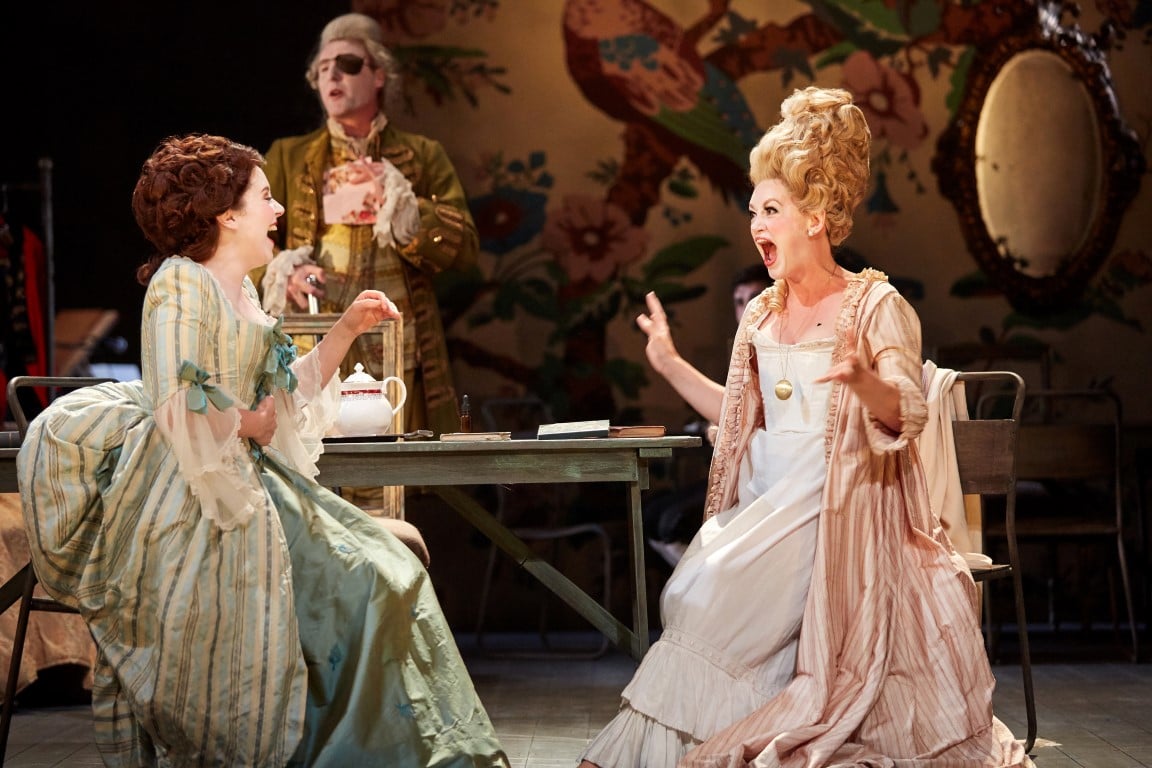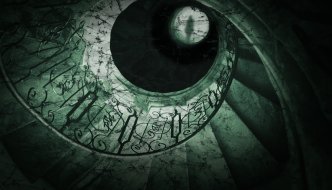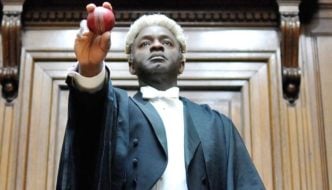
The Rivals. A Bristol Old Vic, Citizens Theatre & Liverpool Everyman and Playhouse co-production. L-R: Julie Legrand, Desmond Barrit, Lee Mengo, Keith Dunphy. Photo Caption: Mark Douet.
It would seem that the mark of quality of any period piece set in its home time is how it can be presented to a new age without translation. The future, like the past, is a foreign country after all. Director Dominic Hill, with designer Tom Rogers, have presented to the Liverpool stage a strange and sumptuous rendition of Richard Brinsley Sheridan’s The Rivals. This is no mean feat and pertains to the opening remarks. The Rivals is not Shakespeare (nor does it or should it pretend to be), it doesn’t espouse universal truths or attempt some century-spanning relevancy – It is a reflection on and a comedy for its own time. It was George Washington’s favourite play. It was written for no other reason than Sheridan was potless. It inarguably belongs to its own century. Starting from this principal Hill and Rogers have not made a rod for their own back and have presented a playful caricature of that century with all the grotesqueness of Hogarth and Rowlandson. As Sheridan himself was presenting such a caricature himself once upon a time, this production of The Rivals feels like a caricature of a caricature with decidedly 21st Century flourishes here and there.
The set and production design is, frankly, gorgeous. To think of the frivolity and excess of that century’s style conjures claustrophobic and cramped atmospheres but here is a wonderful sense of space. Of particular praise is the cheeky reinterpretation of traditional painted cloth backdrops and a series of frames descending to produce a spatial sleight of hand. With minimum props and dressing this effect is especially evocative. Furthermore, certain technical aspects within the theatre can often go unnoticed from reviewers. This is a practice I immediately call time on and say that the lighting design was noticed, greatly appreciated, and is saluted here. At times it strikes almost as though the stage is framed with candlelight which accompanies Rogers’ use of period paintings and art (and frames) in backdrop with subtle value.
At first blush you might be forgiven for thinking you’ve somehow wandered into some Brechtian performance: a largely bare stage lined with clothes railings, no curtain, the actors milling about and preparing, chatting – Sir Anthony offering his flask to an audience member. With the live music, asides becoming fourth wall breaking, the sight of actors beyond, the space, and the bareness of the stage, there is a sensation that with a little leverage further in that direction it would tumble completely into Epic Theatre. Something odd is afoot. There are strange blemishes of anachronism throughout – including a typewriter and a gag with a polaroid that has to be seen in its glory – that lead you to wonder whether or not the cast have just ransacked the prop box and seen what they could do with something.Which in fact, Rogers assures us in the program, is exactly what they did. Thus achieved is an irreverent playfulness that oozes (an important word as you will see) from every wig, arch and fibreglass sheep (again, see for yourself). It is an ideal environment to serve as
Which in fact, Rogers assures us in the program, is exactly what they did. Thus achieved is an irreverent playfulness that oozes (an important word as you will see) from every wig, arch and fibreglass sheep (again, see for yourself). It is an ideal environment to serve as catalyst for the wicked energy of a devilishly vibrant cast.There is not a bad performance in this play. There is not a single instance of a performer not giving their all to the seamless realisation of a rounded and recognisable character. This is not the place to provide the full roll call – that’s what the box office is for – but some performances of note will serve by way of conclusion. Lee Mengo as “Fighting” Bob Acres has wrought a delightful coward and, for me at least, the character most looked forward to coming on stage- a foppish, trembling, Welsh Robin Williams came to mind if you can believe such a thing. Lily Donovan is marvellous as Lucy – who is to blame for more or less all that goes on in the play – the go between feigning stupidity for her own game. She also provides some moments of comic splendour, silently in the background watching, noting, and reacting to the goings on that are really genuinely funny. Whether such moments are intentional or not is all part of the magic of theatre.

L-R: Jessica Hardwick, Lucy Briggs-Owen. Photo Caption: Mark Douet.
There is not a bad performance in this play. There is not a single instance of a performer not giving their all to the seamless realisation of a rounded and recognisable character. This is not the place to provide the full roll call – that’s what the box office is for – but some performances of note will serve by way of conclusion. Lee Mengo as “Fighting” Bob Acres has wrought a delightful coward and, for me at least, the character most looked forward to coming on stage- a foppish, trembling, Welsh Robin Williams came to mind if you can believe such a thing. Lily Donovan is marvellous as Lucy – who is to blame for more or less all that goes on in the play – the go between feigning stupidity for her own game. She also provides some moments of comic splendour, silently in the background watching, noting, and reacting to the goings on that are really genuinely funny. Whether such moments are intentional or not is all part of the magic of theatre.
But the crowning glory – or should that be glories – of the piece are the vernacularly anachronistic Lydia Languish and the linguistically cringing Mrs Malaprop brought to life by Lucy Briggs-Owen and Julia Legrand respectively. Lydia, the focus of the titular rivals’ tryst, could so easily have become another fainting, vapid, ever-so-put-upon maiden fair, all heaving bosom and frenetic fanning. Enter, then, with stroppy aplomb a faux valley girl – a pout beneath the powder. To twist the 18th century’s distinct branch of the English language through the accentual mangle of latter days is a work of comic genius. The declaration of “on my word” with the intonation of “like, OMG” is a lot funnier than it has any god given right to be. The word Malapropism – meaning the misuse of a word – is derived from the character here, who continuously misuses words in an attempt to prove refinement. It is a joke that can get very tired very quickly but Legrand succeeds in keeping it fresh and crisp as she joins the noble line of comedic aunts, without becoming a facsimile of Edith Evans or any of the Wooster tribe. The scenes with the two together are electrically funny, energetic, and smooth as can be desired. Though language nerds and grammar fascisti – like yours truly – will squirm with discomfort, here are realisations of centuries-old characters that are polished and without a cobweb in sight.
So here is a thoroughly modern regency, the aged made ageless. The anachronisms in prop and manner bring about some aesthetic echoes of Plunkett and Maclean even Moulin Rouge and thus creates an impressionistic playground echoing the functions of the past. In that respect, I will argue, the play has not been lost in translation rather than it has been refined.
The Rivals is running at the Liverpool Playhouse until October 29th. You can get your tickets here.
Filed under: Theatre & Dance
Tagged with: Dominic Hill, Julia Legrand, Lee Mengo, Lily Donovan, Liverpool Playhouse, Lucy Briggs-Owen, The Rivals, Tom Rogers



Comments